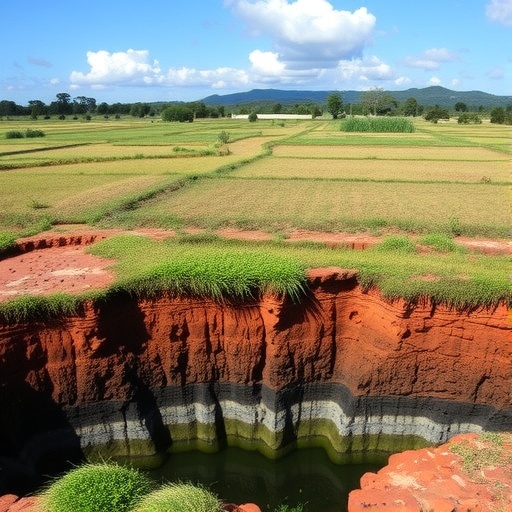The volcanic plateau of Southern Brazil, a region renowned for its unique geological characteristics and ecological significance, is undergoing profound environmental transformations. These changes stem from both anthropogenic land cover shifts and the broader impacts of climatic variation, and their combined effects on groundwater recharge processes are pivotal yet inadequately understood until now. Recent research spearheaded by Wiederkehr, Andrades-Filho, and Mizusaki provides crucial insights into how these dynamic factors interact, revealing significant implications for water resources sustainability in this environmentally sensitive area.
Groundwater recharge—the process through which surface water percolates down to replenish subterranean aquifers—is fundamental to maintaining the hydrological balance of any terrain, particularly in volcanic regions where porous rock formations facilitate unique water flow dynamics. The volcanic plateau in Southern Brazil is no exception. Its aquifer systems are essential for local communities, agriculture, and natural ecosystems. However, the recharge rates are highly sensitive to changes in land cover and rainfall patterns. By investigating these factors in tandem, the latest study elucidates how modifications in vegetation structure alongside climate shifts influence groundwater availability.
The study employed an innovative combination of remote sensing data, hydrogeological modeling, and long-term meteorological records to quantify the impacts of both deforestation and climate variability on groundwater recharge. Researchers observed that the conversion of native forests to agricultural lands and urban areas altered hydrological pathways by increasing surface runoff and decreasing infiltration. This phenomenon intensifies when coupled with shifting precipitation regimes marked by variability in rainfall intensity and distribution, thereby complicating recharge dynamics further.
One of the pivotal findings is that land cover changes, primarily driven by human activities such as farming expansion and urban encroachment, substantially reduce the volume of water infiltrating into the soil. Native forested areas, with their deep-rooting vegetation and organic-rich soils, typically facilitate higher infiltration rates, promoting aquifer recharge. Conversely, the replacement of these forests with impervious surfaces or shallow-rooted crops tends to accelerate overland flow and erosion, diminishing underground water replenishment.
Climate change introduces additional complexity by altering not only the quantity but also the seasonality and intensity of precipitation events on the volcanic plateau. The study highlights that increasingly erratic rainfall patterns, a hallmark of regional climate shifts, undermine the steady percolation of water into the aquifers. Intense storms produce large quantities of runoff that escape infiltration opportunities, while prolonged dry spells reduce soil moisture critical for recharging processes, collectively stressing groundwater systems.
Examining temperature trends alongside precipitation revealed a warming climate exacerbates evapotranspiration rates, extracting more soil moisture and reducing the effective water available for recharge. This thermally induced moisture deficit, when layered onto land cover degradation, could accelerate declines in groundwater reserves, presenting challenges for water-dependent sectors and biodiversity conservation in the region.
To contextualize these findings, the researchers used spatially explicit models calibrated against field measurements across representative portions of the volcanic plateau. This modeling approach allowed them to simulate future scenarios under varied land use policies and climate projections, illustrating trajectories where groundwater reserves either stabilize or diminish drastically depending on management strategies implemented today.
The comprehensive temporal scope of the datasets, spanning multiple decades, offered robust evidence that the synergistic effects of deforestation and climate instability have already disrupted groundwater recharge cycles. More alarmingly, projections based on current trends suggest that if no mitigation occurs, aquifer depletion rates could accelerate by mid-century, precipitating water scarcity crises in urban and rural communities alike.
An important aspect of the study is the identification of potential pathways to mitigate these adverse effects. Reforestation efforts, sustainable agricultural practices, and the preservation of natural landscapes emerge as critical interventions to enhance infiltration capacity and buffer groundwater recharge against climate volatility. The findings advocate for integrated land and water management policies that prioritize ecosystem-based approaches to groundwater sustainability.
The volcanic plateau’s groundwater systems also serve as natural climate regulators due to their role in maintaining soil moisture and supporting vegetation resilience. By safeguarding recharge processes, communities not only secure water supplies but also reinforce ecological functions essential to climate adaptation. Ensuring the integrity of these hydrological cycles aligns local environmental stewardship with broader global sustainability goals.
Scientific understanding of groundwater recharge within volcanic terrains has traditionally been fragmented due to the complex interactions between geology, biology, and climatic parameters. This study bridges many of these knowledge gaps by providing empirical data and modeling insights that capture the multifaceted nature of the processes involved. Its outputs are poised to inform regional water resource management, contributing to resilient frameworks amid accelerating environmental changes.
Moreover, the implications extend beyond Southern Brazil, offering a template for other volcanic or similar landscapes worldwide facing comparable pressures. Groundwater recharge underpins global water security, and unraveling the interplay between human-driven land alterations and climate impacts exemplifies the cutting-edge science necessary to meet twenty-first-century environmental challenges.
As the study concludes, future research directions emphasize the necessity for continuous monitoring using advanced remote sensing technologies and improved climate models with finer spatial resolutions. Such advances would sharpen predictive capabilities, enabling policymakers to devise more precise, adaptive strategies. Long-term stewardship of the volcanic plateau’s groundwater reserves will depend on maintaining this synergy between scientific inquiry and proactive environmental management.
In sum, the groundbreaking work by Wiederkehr and colleagues underscores a crucial environmental nexus: the intersection of land cover transformation and climate change dictates the fate of groundwater recharge in the volcanic plateau of Southern Brazil. The nuanced understanding achieved paves the way for informed actions that can halt or reverse water resource degradation, securing this vital lifeline for generations to come. It is a compelling reminder of the intricate relationship between our choices on land and the invisible, indispensable reservoirs beneath our feet.
Subject of Research:
Article Title:
Article References:
Wiederkehr, F., Andrades-Filho, C. & Mizusaki, A.M.P. Impacts of land cover and climatic changes on groundwater recharge on the volcanic plateau of Southern Brazil. Environ Earth Sci 84, 588 (2025). https://doi.org/10.1007/s12665-025-12604-7
Image Credits: AI Generated




